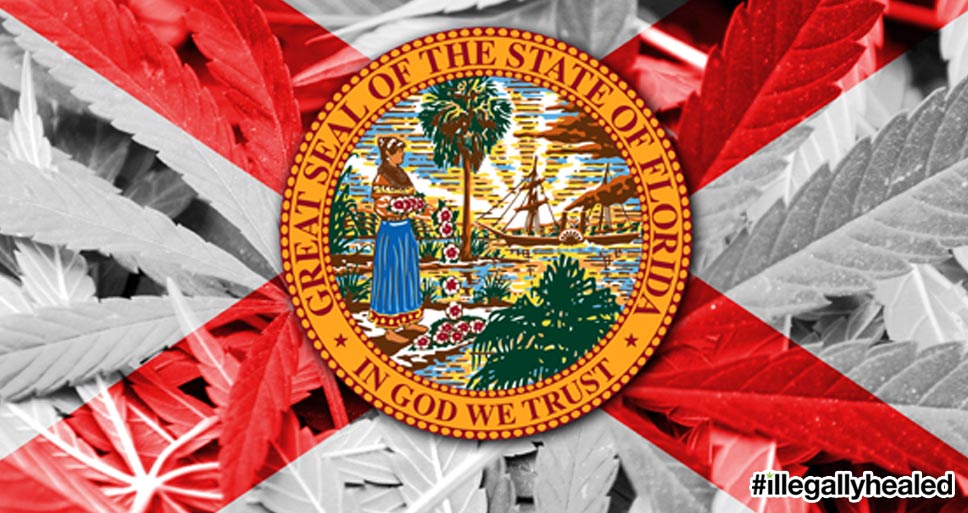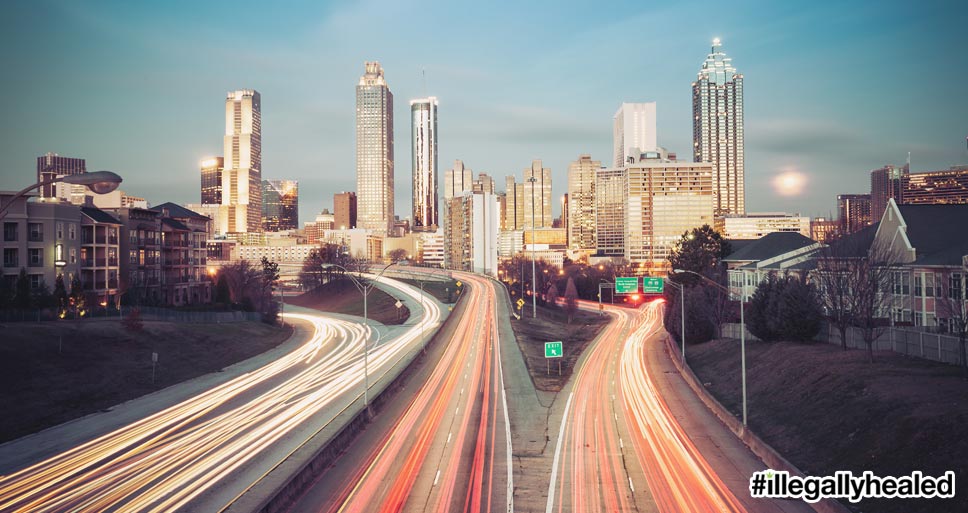Florida has followed in Georgia’s footsteps. Both states’ houses recently passed bills that fine-tuned or enhanced previous medical cannabis laws. But the outcomes are different.

State Representative Allen Peake
Georgia took what was originally a step in the right direction—H.B. 722, authored by State Rep. Allen Peake—and shredded it to an almost meaningless gesture. Originally the bill was written to expand the number of approvable conditions and illnesses from eight to 16. But the legislators decided that offering medical cannabis to, for example, veterans suffering with intractable (i.e., relentlessly agonizing) pain and PTS (post-traumatic stress) wasn’t a good idea. The reason given was that it was felt—by some lawyers, not doctors—that those diagnoses were too vague and would allow people to obtain cannabis to enjoy it.
Intractable pain is defined as severe, constant and incurable pain that causes a bedridden or house-bound state and can lead to early death. Fibromyalgia, peripheral neuropathy, and metastatic cancers are some of the better-known diagnoses associated with intractable pain.
Pain is Big Business
The current treatment for intractable pain is opioids, such as Oxycontin and Demerol. Predictably, Big Pharma is no fan of medical cannabis for chronic pain. The pharmaceutical industry has a powerful and irresistible incentive to keep the populace in need of their prescription medications at all costs. Treating disease and pain naturally would bankrupt and destroy their entire industry, so that logically can’t be their goal.

The global pharmaceuticals market is worth US$300 billion a year.
People growing their own natural medicine en masse and no longer needing pills would threaten their existence as well, so of course pharmaceutical companies are lobbying hard to prevent that.
Despite all the evidence that points to how harmful opioids can be when used to treat chronic pain, the medical industry and legislators pretend to think of cannabis as more harmful. Opioids can, and frequently do, cause death by overdose. At the very least, they cause gnawing nausea, constipation, and addiction. That forces patients into using heroin, since it’s cheaper and often easier to get on the streets than prescription pills.
Cannabis, on the other hand, is not physically addictive and carries no withdrawal syndrome. In 10,000 years of history, death by overdose is unknown; and its side effects are mild by comparison to opioids, whether the herb is smoked, vaped, or consumed via edibles, oils, and tinctures. Ingested cannabis also provides proven, long-lasting relief for chronic pain.
Leadership Lag
Not only did Georgia lawmakers limit the conditions approvable for medical cannabis, they also destroyed the infrastructure that would have allowed for in-state cultivation, making it harder for those with approved conditions to get the medicine they need at the dosage required to be effective. The amounts of cannabis legally available in Georgia are lower than what many patients need, so those folks are still forced to travel out of state and return bringing their medications with them—which happens to be a violation of federal law.
On paper the state of Georgia has approved the use of medical cannabis, but in the real world Georgians are still forced to choose between seeking treatment and suffering while observing federal laws.

A recent poll conducted by News 13/Bay News 9 finds that 61 percent pf Florida voters would vote for Amendment 2 in the November elections
In the state of Florida, conditions are not much better. In 2014, as in Georgia, the Florida legislature voted to approve medical cannabis for limited medical conditions. It made non-euphoric cannabinoid preparations available to patients who suffer from cancer or chronic seizures. But those medicines have not yet been made available to sufferers, because the nurseries who were approved to cultivate and the Florida Department of Health have not been able to come to terms.
The natural medicines were supposed to be available to these patients over a year ago. “The focus in our debate and the media has been largely on who gets to grow it, who gets to make money, who gets to lobby, who gets to invest,” said Rep. Katie Edwards of Plantation, Florida. “The hell with them—who gets to benefit [should be] the patients. That has been largely lost in our debate.”
Help For Those Who Need it Most
The newest bills, H.B. 307 and H.B. 1313 (sponsored by Rep. Matt Gaetz of Fort Walton Beach and Rep. Jason Brodeur of Sanford, respectively) expand the 2015 “Right to Try Act”. That law allows terminally ill patients to have access to experimental drugs that have not yet been approved by the FDA and sets forth regulations and processes for dispensaries to begin providing them.
The bills easily passed the House and will now allow terminally ill patients access to full-strength cannabis. There is already a similar bill in the Florida Senate that is expected to pass if they can control the number of amendments and addendums.
This is a step in the right direction and a godsend to those whose time on earth is sharply limited: Morally, can anyone or any entity really ever be justified in denying suffering patients the right to fight pain with any tool they can find to make their time more comfortable? The sane answer is no. Still, these bills don’t go far enough. Patients need to take action to help themselves.
Magical Medibles

MagicalButter MB2e – Click Image to Save $30
Garyn Angel is the inventor of an ingenious herbal infusion device called a Botanical Extractor, or simply “MagicalButter machine”. He has long been an advocate for medical cannabis approval in all states, most especially in his home state of Florida. He got the idea for a push-button medibles machine in 2011 when his friend, who suffered from Crohn’s disease, wanted to try cannabis but could not smoke it due to asthma.
The home extraction process until then had primarily been done in makeshift fashion, using Crock-Pots and stovetops, and it was not safe, consistent, or foolproof. Some techniques involve using butane or ethanol, which are highly flammable.
Angel set to the task of designing a machine that would rival a coffeemaker in simplicity: Put in the ingredients, push a button, and let the machine do all the work. It is highly popular in the cannabis and cooking communities. But law-abiding patients who can’t access the plant are prevented from making their medicine.
Florida is taking steps to fix the situation, even if they are baby steps; Georgia seems to be in the “one step forward, two steps back” frame of mind. It’s time for all the politicians to stop pandering to the fear that medical cannabis will somehow lead to the downfall of society, and start thinking instead of patients, human beings who desperately need a safe, natural alternative for relief that won’t turn them into drug addicts—or worse.
MagicalButter.com is a proud content sponsor of the #illegallyhealed community.


Comments 1
Pingback: Tale of Two States: Georgia, Florida Experiment With Cannabis Legislation | nextCANNABIS.com | Investing in What's Next in Cannabis.